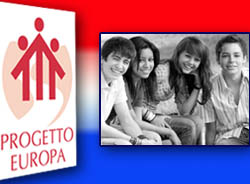

| RMG – GC27: Youth for Youth |
| Croatia – PE: Beginnings, development, difficulties and rebirth |
| RMG – PE: Young people before any other consideration. The Salesians in Croatia and Bosnia and Herzegovina |
Also in Croatia, young people are called upon to win, like their peers from other European countries, the new challenges posed by society and culture. This is what educators, and therefore also the Salesians, must consider in order to listen to and walk together with the young.
Young people and the Church
In 1990, after the collapse of communism, Croatia has had the first free elections. Christianity has had full liberty and has grown rapidly. The Catholic Church was declared autonomous with regard to religion; religious education came into public schools, primary and secondary; a faithful pastoral care has developed in hospitals, the armed forces and the police. The Salesians were able to work freely with young people.
Although Croatia is a traditionally Christian country, young people are struggling to be Christians; Baptism and religious socialization is not sufficient. As in other parts of Europe, young people are lost in an ethically neutral society dominated by subjectivism, relativism, consumerism, hedonism and permissiveness.
The Church remains a great sign, but is losing the influence it once had on society. The traditionally Christian morality is in crisis, young people reject moral norms, faith becomes more and more a personal choice of the individual and the result of the choices one makes.
Among the young people there's still the quest for the sacred, which needs a simple and strong pastoral care, in order to prevent young people seeking for something they believe in, outside the Church. Young people are sceptical about the authenticity of the Church as an institution, but do not reject Christ and the message of the Gospel, indeed, would like to have a living experience of meeting with God in the parish community. The problem lies in the scarcity of pastoral and spiritual help. The Church in Croatia – as also the Salesians – are looking for new models, new paradigms, new proposals for the faithful and the young people, before and after the celebration of the sacraments.
Young people: their hidden side
School attendance is a problem. The primary school, which is compulsory, involves 98% of the boys, but those who enrol at an Institute of Higher Education are just 33% and only 8% complete their studies on schedule. Out of 1000 inhabitants, only 12 are highly-educated professionals; in EU countries, the average is five times higher!
Over the past few decades about 140,000 young people have left the country to seek employment. Youth unemployment is alarming; we speak of 36.6%, in third place in Europe.
The lack of work and the lack of a higher educational qualification – a few manage to graduate when they are 25 years old – have produced the "lost generation" that involves about 60,000 young people who, because of poor education and lack of vocational skills, cannot find jobs and are likely to lag behind and on the fringes of society.
This situation is reflected in the private lives of young people who up to 30 years old are living with their parents, marrying late and choosing to have fewer children. One young adult in three is unemployed. The reasons for this daunting reality are multiple, inter-related and difficult to solve. One of the main reasons is that in Croatia it is very difficult to create new jobs; added to this is the legislation which destabilizes the labour market; and young people are expected to have experience and knowledge of new technologies, which they often lack.
In recent years a large part of Croatia's young people has been affected by the phenomenon of "binge drinking". About 43.8% of teenage boys get drunk once or twice a week, the girls a bit less. Alcohol consumption has exceeded the European average increasing significantly. Two-thirds of the youngsters justify consumption of alcohol as a form of relaxation, group membership, escape from the problems of the family. This often results in 15% of children leaving school, some becoming aggressive and ending up in prison. This phenomenon occurs mainly in large urban areas.
Croatia is a country where tobacco has been grown for centuries and smoking is socially accepted. The law and educational and health interventions seek to prevent, control, even banning smoking, but the smoking habits of young people grows and continues into adulthood with great health risk. Many young people start smoking between 15 and 16 years of age and the habit often remains for years.
24% of boys and 20% of girls at least once in their life have tried marijuana, which, in the consumption of illegal drugs, takes first place.
Young people and the family
The young always decide to marry later, confused by many illusions, unreal expectations and myths created by the collective imagination. Fatherhood radically changes the life of a young adult who sees himself suddenly immersed in responsibility, with priority objectives, a new lifestyle, and changes in social relations.
The family plays an important role in the lives of young people, but this is perceived more as a need, a utility, instead of a membership. Internal relationships are weakened, the parent-child relationship does not proceed correctly, i.e. are not stable. So much so that inner fragility is at the root of crises, violence and divorce.
Published 06/11/2012
